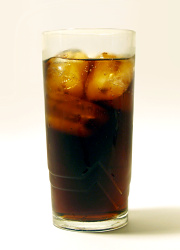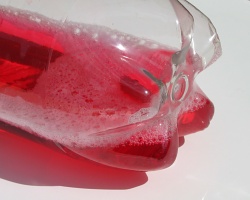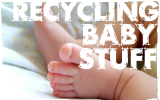How can I reduce my waste from drinking fizzy drinks/soda?
 (Apologies for the downtime yesterday – our hosting provider had a huge hardware failure. As I also work for our hosting provider, I was stressed from both sides – not a good day!)
(Apologies for the downtime yesterday – our hosting provider had a huge hardware failure. As I also work for our hosting provider, I was stressed from both sides – not a good day!)
We’ve had an email from Jo:
Hi. Got a question for you. Is it better to buy pop in big bottles or cans from a packaging point of view? Big bottles seem like less waste for the amount of liquid but are plastic. Your thoughts?
Neither are great for a number of reasons. Aside from the actual waste from the packaging, it’s really resource-intensive to ship around liquid in anything other than pipes – and the production tends to be pretty bad for the environment too, let’s not forget about the production.
But to the question in hand, both the plastic and metal are non-renewable resources, the creation of which is very destructive to the environment, but both can be recycled and are widely collected. If though, you can only recycle one or the other in your local area, that might sway you one way or the other.
The easiest way to reduce the waste is, of course, to reduce consumption of the drinks in the first place. Or make them at home – either getting the fizz through a natural process (like making homemade ginger beer) or a less natural one.
I usually prefer bottles – we don’t drink much fizzy stuff at all and when we do have it, prefer little amounts rather than full cans – and even though we no longer have doorstep recycling of plastics, plastic bottles have more reuses around the home and garden.
Anyone else got any input? What about suggestions for reducing the amount of fizzy drinks drunk – what are similar but better alternatives?
























Living here in the southern USA we drink iced tea by the gallons. It doesn’t need bottles or cans as I make it by the gallon, reusing the same pitcher every time. I read that black or green tea is very healthy for you, but I think green would be better (if I only had the discipline). Just plain old water is good too, and I think would be even healthier.
Generaly, fizzy drinks bought in both cans and plastic bottles are best avoided if you want to keep healthy and slim. For a start, the sugar content – in the “non-diet” form – is extremely high – most contain around 12% sugar by weight, so a standard 350 cm3 can holds approx 42 g of sugar – or about 8 teaspoons full. Then, the type of sugar is also questionable – many manufacturers have abandoned sucrose in favour of the cheaper alternative, Hi-fructose corn syrup, which is now starting to be linked with obesity and diabetes – as it raises blood sugar levels without being under control of the insulin / glucagon system.
So, is it better to drink diet versions? Not really – most of the artificial sweeteners are now being looked at as either potential carcinogens – the cyclamates and saccharins – or as behaviour modifiers – aspartame.
So – the rest of the drink is just water, colouring and fruit flavouring – why not make your own? I don’t want to be political – but if you think about it, fizzy drinks are just another way for international companies to get rich by selling what is effectively just sweetened water for vast profit margins…
How about a Soda Stream drinks maker?
You can get the gas canisters refilled and don’t have to use the pre made concentrate. We use our to make soda water and use that the ‘sparkle’ up normal squash or make a nice white wine spritzer for Friday evenings!!
Where I used to live the tap water wasn’t safe to drink so we bought water in bottles at the grocery store – the pipes weren’t of the kind we could attach any filters to. The bottles were not returnable, but were collected for recycling. Still are.
Should I now for some reason be in need of bottled water, I try to get a particular brand so I get the right bottle to make into self-watering planting pots.
The aluminium cans can be transformed into scarecrows/-deers or markers in the garden, but they’re pretty useless otherwise for the regular person. I have seen fabulous artwork and even more fabulous adobe walls where soda cans have been cleverly used, though. We don’t drink fizzy drinks or sodas at all except for the occasional beer, which we usually get bottled. I’ve seen bottles used in adobe construction, too. We reuse them when brewing.
Fizzy drinks are terrible for all kinds of reasons – you know that the guys who transport Coca Cola concentrate use it to clean their engines?!?
I only ever buy it for cleaning metal with (leave overnight and it softens all the gunk so things scrub up nice. In the same way that it softens up your teeth…)
Anyway, if you really can’t do without then you may find you’re addicted to sugar and caffeine, which at least are available in more eco-friendly formats.
Try tea with lots of sugar in it, or hot chocolate, or any other very sweet drinks to help you wean yourself off the fizzy pop.
Yes, they made be bad for your health, but not everyone (including me) is always so concerned with the ramifications of high fructose corn syrup. If you are going to drink soda-pop, I would try getting it from cans. Aluminum is almost 100% recyclable, where as plastic is not. As long as you recycle the cans, they will probably be able to turn them into all new cans at the factory. Sounds good to me.
I would agree with Emily there. Eliminating carbonated drinks entirely is quite impossible — there will always be parties and gatherings to host and attend. If you must, then go for the aluminum option. Making new cans from recycled cans uses only 10% of the energy it takes to make a new ones from raw material. For this reason, always recycle your cans — if you were to cut them up to make toys, pen holders and suchlike with, they will only end up in the landfill in a few years (particularly if you have used glue and paints), but if you deposit them into a recycling bin, they ALWAYS get a new life as a new can, thus saving energy and natural resources.
If it is the carbonation you are addicted to, try making your own fizzy drinks, from juices and drink concentrates! Check out the soda machine I saw here:
http://www.cnet.com/8301-13553_1-9995805-32.html
I would tend to agree – but have you considered how much energy it takes to make 6 cans of 330ml each as opposed to one 2l plastic bottle?
We need to consider how eco-friendly the processes involved in making the packaging in the first place are as well as what is going to happen to it afterwards .
Your other point was that if you make new things out of old things they’re still going to end up in landfill – but if you made a pencil holder or whatever out of a can , then you wouldn’t have to buy a pencil holder, which would also eventually end up in landfill. Thus if you do turn the can into a pencil holder you are saving a new object from landfill, and saving the energy that it would have taken to make the pencil holder in the first place.
Soda stream all the way!!
As well as reasons already stated by others think of the eco unfriendliness of producing and transporting fizzy drinks.
This is a very relevant question for me: I love my evening soda water, but I feel ridiculous buying it in plastic bottles.
We’re thinking of getting a Soda Stream — does anyone have any views about their impact on the environment?
The idea for homemade ginger beer seemed like a good idea. For some other tastes though, you could always try your hand at water kefir or kombucha. There’s other less soda-like ones that still might be satisfying anyway. Pretty much any fermented drink can be made bubbly. The great “side effect” is that you get a large dose of probiotics to help your immune system and digestion. It’s been claimed that 70-80% of our immune system is in our intestines – which happens to be populated by these bacteria. There’s also not too much sugar or any artificial ingredients. (I stand by yacon with is FOS for my sweet fix, I sneeze when I have most other sugars. i.i)
Another thing I’ve done recently is make my own mineral water with calcium carbonate and magnesium citrate. Kind of gives it a little zip, I also added it to some lemongrass tea to get a drink that didn’t really need any sweetening.
But, as suggested in the comments above – teas (from bulk bins – as it requires no packaging if you bring your own container or a blank plastic baggie) of all sorts and water are probably some of the easier, healthier alternatives. I have seen for a fact (for several people) that green tea really does help oral health and improve breathe, opposite of soda/sugar which just feeds the nasty stinky critters. It might be of benefit to just drink a variety of things, focusing on (hopefully filtered at home) water and natural, unsweetened drinks prepared at home. Plus enjoy some fizzy, sweeter probiotic drinks once a day or…whatever percentage you work out.